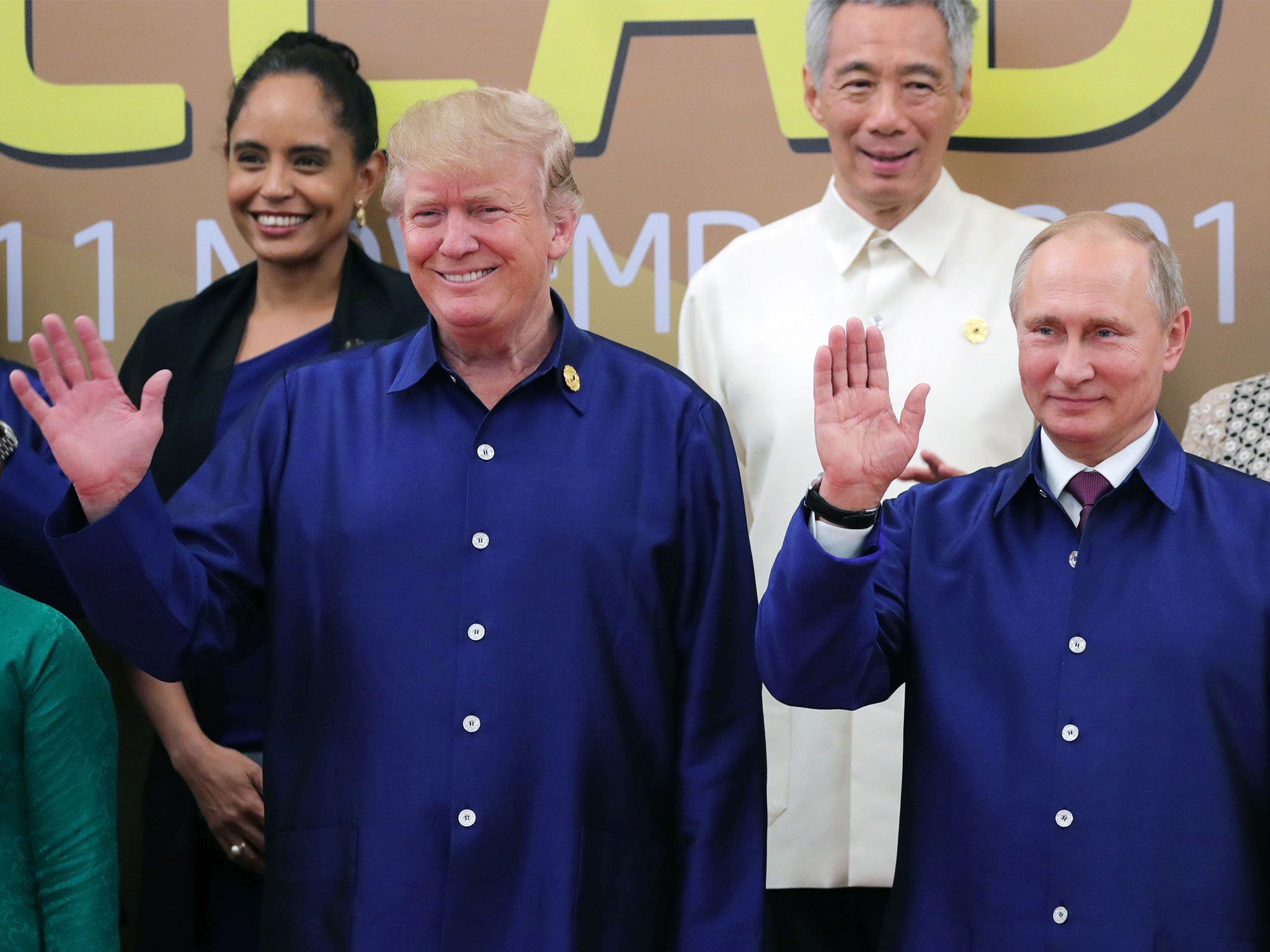Donald Trump 'snubs' formal Putin meeting at APEC summit in Vietnam
Weeks of intense preparation had gone into prospect of bilateral talks, with hopes for a genuine breakthrough on Syria and North Korea. But in the end, the US decided the time ‘wasn’t right’

Your support helps us to tell the story
From reproductive rights to climate change to Big Tech, The Independent is on the ground when the story is developing. Whether it's investigating the financials of Elon Musk's pro-Trump PAC or producing our latest documentary, 'The A Word', which shines a light on the American women fighting for reproductive rights, we know how important it is to parse out the facts from the messaging.
At such a critical moment in US history, we need reporters on the ground. Your donation allows us to keep sending journalists to speak to both sides of the story.
The Independent is trusted by Americans across the entire political spectrum. And unlike many other quality news outlets, we choose not to lock Americans out of our reporting and analysis with paywalls. We believe quality journalism should be available to everyone, paid for by those who can afford it.
Your support makes all the difference.As the first day of the Asia-Pacific Economic Cooperation (APEC) leaders’ summit in Vietnam drew to a close, things were not looking too promising. Mr Putin was there. Mr Trump was absent. For all the Kremlin’s insistence that a formal meeting between the presidents was about to happen, the White House seemed to offer different thoughts.
The two leaders did eventually cross paths, exchanging handshakes and brief comments during the summit’s official dinner.
But all throughout Thursday, Kremlin officials had treated the second bilateral meeting of the presidents as a fait accompli. President Putin’s aide Yuri Ushakov said the only thing left undecided was the time. The Russian foreign minister Sergei Lavrov said they were “ready” for negotiations. Even the Americans initially seemed game. President Trump said that he saw “no reasons” why the meeting should not take place.
On Friday morning however, aboard Air Force One, the President’s press secretary Sarah Sanders walked back the chances of a full, bilateral meeting.
The White House did not “anticipate” there would be a “formal” tete-a-tete, she said. There were “scheduling conflicts on both sides”, issues that the Russians had neglected to mention. An informal interaction wasn’t ruled out: “They’re going to be in the same place. Are they going to bump into each other and say hello? Certainly possible, and likely.”
Lavrov, never hostage to political correctness, summed up the Russian frustration. How was he to know what Mr Trump’s “pen-pushers” thought about the possibility of a formal meeting? He replied angrily: “Ask them yourselves.”
The Kremlin tried to save face. There were “conflicting signals” from Washington, the presidential spokesman Dmitry Peskov told the Ria Novosti news agency: “We don’t quite understand what’s happening, but are patiently working to an understanding.”
Mr Peskov’s remarks had, in fact, come at the end of weeks of intense preparation. There had been discussions at ministerial level. US ambassador Jon Huntsman, just a month into the Moscow job, had met with senior foreign ministry officials to decide on a common agenda.
That task was a near-impossible one. Since the first and only face-to-face meeting between presidents in Hamburg, relations between the two countries have plummeted to historical lows – and policy disagreements have widened.
There is the matter of four investigations into Russian involvement in the 2016 elections; the new American sanctions against military firms and oligarchs, due to come into effect in February; the tit-for-tat expulsions and diplomatic compound closures. And an information war that threatens to spiral out of control.
This month, the Kremlin-funded RT was forced to register as a “foreign agent”. An asymmetric “mirror” response against CNN, Radio Liberty, Twitter and Facebook is expected next week.
There was little illusion that progress would be made on the major sources of tension – the diplomatic expulsions, sanctions or the increasing disagreements on missile accords. These were off the immediate agenda.
“The two thought this wasn’t the right time or venue, but the problems are still there,” Maxim Suchkov, non-resident expert of the Russian International Affairs Council, told The Independent.
The main items on the agenda were instead supposed to be Syria and North Korea.
“Ending the disagreement on Syria has been in the common interests of both Moscow and Washington for a long time,” said Mr Suchkov. While there were differences on the role of Iran and Bashar al-Assad, progress was possible on de-escalation and moving the peace process from Astana in Kazakhstan to the more neutral Geneva, he said.
Mr Trump’s inability to commit to a meeting will do little to encourage Russian hopes of progress. The Kremlin is becoming resigned to the reality that the President is largely powerless to affect US-Russia relations.
“They are now preparing themselves for living in the US sanctions mode for at least the coming decade,” says Mr Suchkov. “The question is whether the Europeans might ease the pressure sooner.”
While Russian advisers understand the domestic pressures faced by President Trump, today’s demonstrative indecision will not have played well in Moscow.
“This was not so much a snub as evasion,” says Mark Galeotti, senior researcher at the Institute of International Affairs Prague.
“But even if it leaves Putin looking snubbed, far more serious is the extent to which is leaves Trump looking cowardly.”
Join our commenting forum
Join thought-provoking conversations, follow other Independent readers and see their replies
Comments